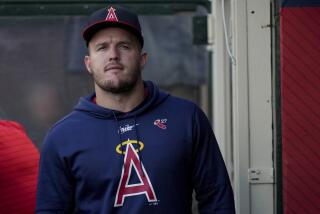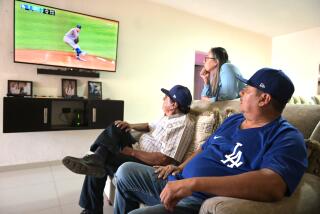A See-Saw Future : Eye Trouble Has Puckett Wondering If and When He’ll Play Again
- Share via
MINNEAPOLIS — The photo of Kirby Puckett in uniform is taped to the side of his Metrodome locker. A black patch has been inked over his right eye.
The Minnesota Twins’ outfielder sees it for the first time and explodes in laughter.
“One-eyed Jack,” he says. “Every day it’s something new.”
Clubhouse humor. Gallows humor.
Got to laugh or you might . . .
Well, Puckett isn’t about to cry and doesn’t wear a patch.
He understands perspective, having come out of the projects on Chicago’s south side to earn $6 million a year playing a game he played for fun on those mean streets, in the shadows of the old Comiskey Park.
He isn’t complaining or screaming, “Why me?,” but if perspective gives way to frustration at times, it’s understandable.
A career headed for Cooperstown is on hold. Puckett still sees spots and darkness out of his right eye. A 90-mph fastball? The depth and spin of a curve? No way. He hasn’t played in 1996. Will he play again?
“The jury is still out,” said Dr. Bert Glaser of the Retina Institute of Maryland.
Puckett sits at his locker. His innate exuberance, the bright face with which he approaches life, fades some.
“I wake up every morning, shut my left eye and hope I can see out of my right eye,” he says. “I keep hoping I’ll wake up with the light on, but it’s still like midnight.”
And it came upon him with no warning.
Puckett laced two hits off the peerless Greg Maddux of the Atlanta Braves in an exhibition game in Florida on March 28.
He woke up the next morning and could barely see out of his right eye.
The left was fine, but with the right he could barely discern his wife, Tonya, in the bed next to him, barely make out the doctor who would soon stand in front of him.
“It can happen that fast,” said Glaser. “One day you’re fine. The next, your vision is drastically reduced.”
Puckett has an occlusion of the central retinal vein, blocking blood flow to the retina. In the early stages of glaucoma, the occlusion is a risk factor as high blood cholesterol is a risk factor in heart attacks, Glaser said.
Puckett is 35 and otherwise healthy, but some forms of glaucoma strike early. The vision in Puckett’s right eye went from 20/20 to 20/200.
He was suddenly and legally blind in that eye.
On April 17, Glaser performed an innovative laser procedure to repair the blood vessels, diffuse the blockage, increase the blood flow.
Puckett’s vision has hovered in the 20/100 range since, said Glaser, who added:
“It’s easy for us to come up with numbers, but it’s the athlete who has to hit the 90-mph fastball and gauge the break on a curve.
“However, I would say that it has to get to 20/40, 20/50 for Kirby to even consider [playing again]. Is it possible to reach that level? Yes. Will it? We’re in a watch-and-wait mode.
“Retinal tissue, like brain tissue, heals slowly. There’s been progress, but this process is still new. In some cases it works extremely well. In some it doesn’t.
“There is no timetable. This is a situation measured in weeks and months. If the progress stops for a few weeks, then we would have to say that’s as far we can go.”
In an attempt to accelerate the process, Puckett had a second laser procedure last Friday and expects to have another Monday. He uses eye drops to control the glaucoma, but because of retinal damage, contact or corrective lenses will not help him get where he needs to be as a major league hitter. His vision will have to improve naturally.
“I’m trying to deal with it as best I can,” Puckett said. “The first month was OK. Now I’m in the third month and sort of going crazy. Every day is a struggle [mentally].
“My game has been reduced to batting practice and that’s kind of tough. Every time I see [Paul] Molitor hit, I’m thinking I’m supposed to be on deck. Every time we lose a game, I think maybe I could have made a difference.”
Could have made a difference? Puckett collected more hits in his first 10 seasons than any other player in this century. He has won a batting title, a runs-batted-in title, six Gold Gloves. He has five seasons of 200 or more hits and a total of 2,304. At 34, he had 39 doubles, 23 homers and 99 RBIs last year. He had 112 RBIs in 108 games in 1994. He had never been on the disabled list before this.
“You’re talking about a guy who can carry a team for three weeks at a time,” General Manager Terry Ryan said. “It also seems like he brings a lot of energy that isn’t there when he’s not in the lineup.”
Puckett has this season and next remaining on a five-year, $30-million contract. Once he had been sidelined for 60 consecutive days, a $775,000 insurance policy kicked in. The carrier is now paying half of his salary through April of 1997, then 75% through the rest of his contract.
If he returns for even one day, however, the 60-day waiting period starts again, but for Puckett and the Twins, this is not about money.
It is about presence, charisma, leadership. Playing the game hard, with flair.
“We’re obviously affected more by his absence than anyone else, but it’s the fans who are cheated, the game that’s cheated,” Manager Tom Kelly said.
“You go into Baltimore and Boston and New York and see all the banners for him and hear the people screaming his name and you realize how much he’s missed. Baseball needs the Kirby Pucketts, Ken Griffeys, Cal Ripkens to offset what’s gone on the last couple years.”
Puckett still travels with the Twins and is in uniform for every game, but he generally retreats to the clubhouse or weight room after four or five innings.
“He’s still great with the other players, but it eats him up to just sit there,” Kelly said. “It’s too hard. I understand that.”
Puckett still ropes line drives in batting practice, the ball jumping off his bat, but that’s not Randy Johnson or Mike Mussina out there. He’s hitting lazy curves, belt high fastballs at 50 mph. He doesn’t have to pick the ball up out of the pitcher’s hand, determine at once whether its fastball or breaking ball. In the batting cage it’s not a split-second test of hand-eye coordination.
“There’s no comparison between batting practice and a game situation,” Puckett said.
“I was hit in the face with two good eyes last year. I’d be crazy to try it with one good eye.”
A fastball by Dennis Martinez of the Cleveland Indians ended Puckett’s season last Sept. 28.
Martinez has expressed concern that the beaning led to Puckett’s vision problem, but Glaser said he thought it was strictly the result of the early stages of glaucoma.
Mail and faxes pour in for Puckett, offering solutions, remedies. Canes. Advertisements for courses in Braille. As if he were totally blind.
Puckett shakes his head. He talks about umpire John McSherry dying on the field in Cincinnati, and of visiting a 17-year-old girl dying of cancer during spring training, and of a sister who recently suffered a stroke--people who have it worse than he does.
“No one wants to see more than I do or play more than I do, but I have the opportunity to live a full life no matter what,” he said. “I can still see my beautiful wife and beautiful kids. I can still drive a car. I can fish and do everything except my job.
“I’ll be disappointed, of course, if I can’t play again, but the game doesn’t owe me anything. I’ve been financially secure for a long time. I’ve had 12 years without ever being hurt, working to be one of the best, going as hard as I can for as long as I can.
“I’ve always appreciated the game, respected the game, never taken it or anything else for granted. Unfortunately, not many guys play it the way it should be played anymore. We’re a dying breed, I think, and we’d all like to go out on our own terms, but you don’t see me sitting around saying, ‘Why me? Why now?’
“I’m praying that it gets better, but I always remember what my parents told me. They’d say things happen for a reason but sometimes that reason isn’t always apparent.”
Said Glaser: “I’ve never known anyone more solid or who copes as well. He’s a positive, forward thinker who’s taking this one step at a time.”
That’s all Puckett can do for now. He said Glaser has indicated there’s a 50-50 chance his vision will improve, but whether it will be good enough to play again is the question.
“I’m an optimist,” Puckett said. “I believe I’ll play again. If not this year, maybe next. If not, I’ll just have to pack up, move on and give someone else a chance.
“That would be sad for me because this is all I know, but I can’t do it if I can’t see.”
The Twins believe Puckett may know where he stands by next month’s All-Star break. It will have been three months since the initial surgery, a fair measure of his recovery and whether it will continue.
Said agent Ron Shapiro: “Kirby has a wonderful sense of perspective and a realization he’s not disabled for life. We’ve discussed possibilities but we haven’t set a date or timetable.
“He’s in the hands of a wonderful doctor, and there’s the potential for success. Kirby often compares it to the ’91 World Series, when the Twins were behind [the Atlanta Braves, three games to two] and everyone was counting them out and Kirby kept saying he’d bring them back and he did.
“He’s a true believer.”
Even, Puckett would add, as a one-eyed Jack.
(BEGIN TEXT OF INFOBOX / INFOGRAPHIC)
The Eye Damage
The damage to Kirby Puckett’s eye took place in the retina, the part of the eye that captures light rays and sends the on to the brain. Corrective lenses or other procedures cannot help restore his vision to the level a professional baseball player requires. Such improvement needs to occur naturally.
Source: World Book
More to Read
Go beyond the scoreboard
Get the latest on L.A.'s teams in the daily Sports Report newsletter.
You may occasionally receive promotional content from the Los Angeles Times.










